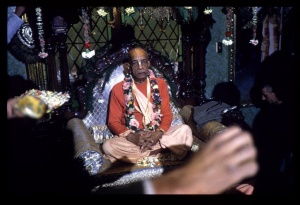CC Adi 12.84 (1975): Difference between revisions
(Vanibot #0027: CCMirror - Mirror CC's 1996 edition to form a basis for 1975) |
(Vanibot #0020: VersionCompareLinker - added a link to the Version Compare feature) |
||
| Line 2: | Line 2: | ||
<div style="float:left">'''[[Sri Caitanya-caritamrta (1975)|Śrī Caitanya-caritāmṛta (1975)]] - [[CC Adi (1975)|Ādi-līlā]] - [[CC Adi 12 (1975)|Chapter 12: The Expansions of Advaita Acārya and Gadādhara Paṇḍita]]'''</div> | <div style="float:left">'''[[Sri Caitanya-caritamrta (1975)|Śrī Caitanya-caritāmṛta (1975)]] - [[CC Adi (1975)|Ādi-līlā]] - [[CC Adi 12 (1975)|Chapter 12: The Expansions of Advaita Acārya and Gadādhara Paṇḍita]]'''</div> | ||
<div style="float:right">[[File:Go-previous.png|link=CC Adi 12.83 (1975)|Ādi-līlā 12.83]] '''[[CC Adi 12.83 (1975)|Ādi-līlā 12.83]] - [[CC Adi 12.85 (1975)|Ādi-līlā 12.85]]''' [[File:Go-next.png|link=CC Adi 12.85 (1975)|Ādi-līlā 12.85]]</div> | <div style="float:right">[[File:Go-previous.png|link=CC Adi 12.83 (1975)|Ādi-līlā 12.83]] '''[[CC Adi 12.83 (1975)|Ādi-līlā 12.83]] - [[CC Adi 12.85 (1975)|Ādi-līlā 12.85]]''' [[File:Go-next.png|link=CC Adi 12.85 (1975)|Ādi-līlā 12.85]]</div> | ||
{{CompareVersions|CC|Adi 12.84|CC 1975|CC 1996}} | |||
{{RandomImage}} | {{RandomImage}} | ||
==== TEXT 84 ==== | ==== TEXT 84 ==== | ||
| Line 18: | Line 17: | ||
<div class="synonyms"> | <div class="synonyms"> | ||
śrīnātha | śrīnātha cakravartī—of the name Śrīnātha Cakravartī; āra—and; uddhava dāsa—of the name Uddhava dāsa; jitāmitra—of the name Jitāmitra; kāṣṭhakāṭā jagannātha-dāsa—of the name Kāṣṭhakāṭā Jagannātha dāsa. | ||
</div> | </div> | ||
| Line 32: | Line 31: | ||
<div class="purport"> | <div class="purport"> | ||
The Śākhā-nirṇaya, verse 13, mentions Śrīnātha Cakravartī as a reservoir of all good qualities and an expert in the service of Lord Kṛṣṇa. Similarly, verse 35 mentions Uddhava dāsa as being greatly qualified in distributing love of Godhead to everyone. The Gaura-gaṇoddeśa-dīpikā, verse 202, mentions Jitāmitra as the gopī named Śyāma-mañjarī. Jitāmitra wrote a book entitled Kṛṣṇa-māyurya. Jagannātha dāsa was a resident of Vikramapura, near Dacca. His birthplace was the village known as Kāṣṭhakāṭā or Kāṭhādiyā. His descendants now reside in villages known as Āḍiyala, Kāmārapāḍā and Pāikapāḍā. He established a temple of Yaśomādhava. The worshipers in this temple are the Gosvāmīs of Āḍiyala. As one of the sixty-four sakhīs, he was formerly an assistant of Citrādevī-gopī named Tilakinī. The following is a list of his descendants: Rāmanṛsiṁha, Rāmagopāla, Rāmacandra, Sanātana, Muktārāma, Gopīnātha, Goloka, Harimohana Śiromaṇi, Rākhālarāja, Mādhava and Lakṣmīkānta. The Śākhā-nirṇaya mentions that Jagannātha dāsa preached the Hare Kṛṣṇa movement in the district or state of Tripura. | |||
</div> | </div> | ||
Latest revision as of 14:52, 26 January 2020

A.C. Bhaktivedanta Swami Prabhupada
TEXT 84
- śrīnātha cakravartī, āra uddhava dāsa
- jitāmitra, kāṣṭhakāṭā-jagannātha-dāsa
SYNONYMS
śrīnātha cakravartī—of the name Śrīnātha Cakravartī; āra—and; uddhava dāsa—of the name Uddhava dāsa; jitāmitra—of the name Jitāmitra; kāṣṭhakāṭā jagannātha-dāsa—of the name Kāṣṭhakāṭā Jagannātha dāsa.
TRANSLATION
The fifteenth branch was Śrīnātha Cakravartī; the sixteenth, Uddhava; the seventeenth, Jitāmitra; and the eighteenth, Jagannātha dāsa.
PURPORT
The Śākhā-nirṇaya, verse 13, mentions Śrīnātha Cakravartī as a reservoir of all good qualities and an expert in the service of Lord Kṛṣṇa. Similarly, verse 35 mentions Uddhava dāsa as being greatly qualified in distributing love of Godhead to everyone. The Gaura-gaṇoddeśa-dīpikā, verse 202, mentions Jitāmitra as the gopī named Śyāma-mañjarī. Jitāmitra wrote a book entitled Kṛṣṇa-māyurya. Jagannātha dāsa was a resident of Vikramapura, near Dacca. His birthplace was the village known as Kāṣṭhakāṭā or Kāṭhādiyā. His descendants now reside in villages known as Āḍiyala, Kāmārapāḍā and Pāikapāḍā. He established a temple of Yaśomādhava. The worshipers in this temple are the Gosvāmīs of Āḍiyala. As one of the sixty-four sakhīs, he was formerly an assistant of Citrādevī-gopī named Tilakinī. The following is a list of his descendants: Rāmanṛsiṁha, Rāmagopāla, Rāmacandra, Sanātana, Muktārāma, Gopīnātha, Goloka, Harimohana Śiromaṇi, Rākhālarāja, Mādhava and Lakṣmīkānta. The Śākhā-nirṇaya mentions that Jagannātha dāsa preached the Hare Kṛṣṇa movement in the district or state of Tripura.